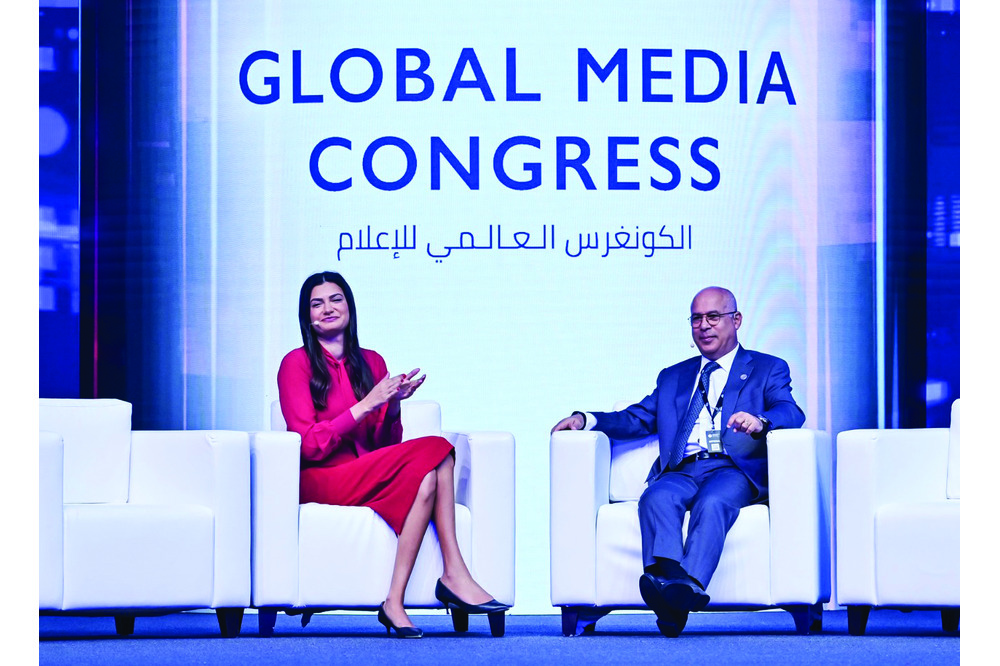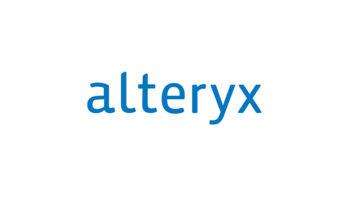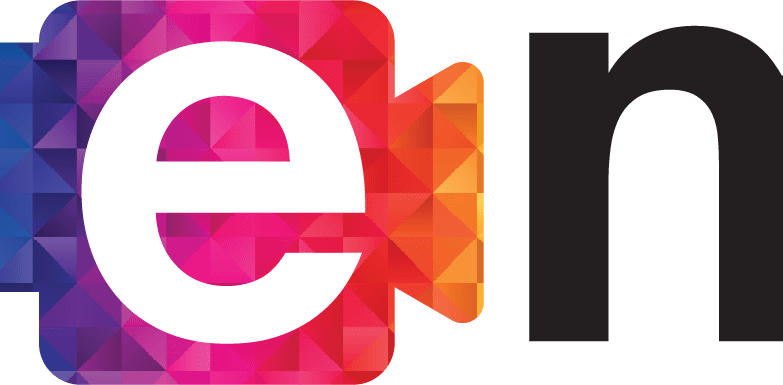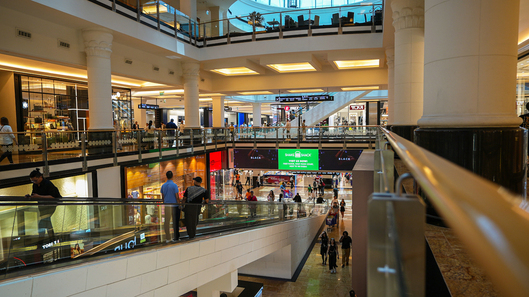Abu Dhabi, United Arab Emirates — On the second day of the recently held Global Media Congress in Abu Dhabi, Choueiri Group’s Chairman and CEO, Pierre Choueiri, was interviewed during an insightful fireside chat with Lenah Hasaballah, Editor CNN Business Arabic (U.A.E.)
The interviewer highlighted the traditional role of the media sector in preserving Arab culture and delivering vital news and content to millions of viewers across the Arab region and around the world, before reiterating how technological advancements, digitization, and social media’s rise to becoming the primary platform for content consumption are posing formidable and pressing challenges.
Responding to these developments and sharing his thoughts on the impact of digitalization and social media, Mr. Choueiri set the stage by stating that: “Before we delve into the challenges facing Arab media, it’s crucial to identify our target audience. Who are we addressing? The Arab population of 350,000,000 or specifically 150,000,000 individuals? With a notable 60% of this population (approximately 200,000,000 people) under the age of 30, the major question for Arab media becomes, are we effectively engaging with this demographic? It appears that Arab media is not effectively communicating with this demographic in their language, as these are individuals who predominantly communicate via Tik-Tok, Facebook and Instagram and make decisions within the first 6 seconds of a news segment. They prefer content that lasts around 2 to 2.5 minutes. Furthermore, this demographic is predominantly mobile-first and “on the move.” Consequently, content should be tailored to their needs.
Questioned on the significance of content, Mr. Choueiri emphasised the importance of “continuous evolution in order to align with ever-changing requirements”. He also said that “Achieving this requires access to sufficient data and research, whether it’s through monitoring viewership, analysing reading patterns, or adopting various learning methods that facilitate adapting the content to what resonates. Moreover, in discussing technology, it’s essential to recognize that the key is not just having access to technology but adopting it effectively. We must stay abreast of technological advancements and employ methods that leverage these innovations. Finally, as for the distribution of content, it’s a matter of staying responsive to current trends while anticipating future developments. It involves using distribution methods that are effective in the present and being adaptable to embrace new approaches as they emerge”.
With the interviewer focusing the conversation on the impact of social media across the Arab media landscape, and the dominance of foreign platforms and companies across the sector, Mr. Choueiri expressed great hopes for the development of local and indigenous platforms: “We have the capability to create an Arabic version of TikTok, and there’s no reason why we shouldn’t utilize it for our content. These platforms exist and can serve as a channel for our content, particularly in the short-form format. Currently, we have long-form content, such as streaming services, which compete with foreign platforms. I’d like to emphasize the importance of surrounding ourselves with legislation. However, it should be protective, without negatively impacting us. As media serves as the fuel for advertising. Protecting the sector is crucial. For instance, in France, they have implemented taxes on Google to support the publishing sector. Finally on the way to manage the Arab Entertainment Media, I want to convey a clear message – it needs to be managed as a private company, focusing on results and performanceon profit and loss as this will be key to generating premium quality content for our region.”.
He also elaborated on the significance of investment per person ratios: “Most GCC countries spend around $100 per person, while in the United States, it’s ten times more at $1000. In contrast, the entire Arab world invests only $14 per person on media, indicating a very low investment that directly impacts the quality of content. Another point to consider is that with a total spending of $5 billion in the region, 65% goes to digital and 35% to non-digital channels. In the Arab world, 80% is invested in digital, which, in my opinion, is not balanced. Most of these budgets go to major international companies like Meta, Google, TikTok, and Snap. The remaining amount for investment in local content is insufficient. Here, we need to focus on and protect local investments. In Arab countries, we already have successful streaming platforms like Shahid or Starz Play, which are more successful than Netflix in the Arab world. To stimulate investment growth in the region, it should ideally be five times larger ($5 billion should become $25 billion). Achieving this requires increasing media spending in the Arab world, focusing on content, distribution, and data. Additionally, adopting technologies like AI is crucial. The most significant aspect is ensuring that the results are on par with international platforms. If we can achieve this, media investment will naturally experience significant growth”.
Expressing optimism for the future of traditional media, Mr. Choueiri stated that “The idea that traditional media is coming to an end is not accurate. Instead, it’s evolving and adapting. While it’s true that physical newspapers are diminishing, they are transitioning to digital platforms such as mobiles and tablets. For instance, the viewership of traditional television networks like CBC and ABC in the USA has evolved to individual networks adapting to technology. G42 for instance is working on AI in the Arabic language, highlighting the need to evolve while incorporating technology. At an event which I recently attended, the CEO of Netflix stated that TV is dead, and interestingly, he began his presentation with the question, “Is radio dead?” This emphasized that TV is not dead; rather, it’s the content that remains paramount, as content is everything”.
On enhancing the collaboration between media and advertising, Mr. Choueiri concluded his interview by saying that “In my opinion and based on my experience, the media, especially in the UAE, has been successful. This success suggests that Arabic producers have the capability to enhance their productions, and I believe we are on the path to achieving even more success stories in the very near future”.













